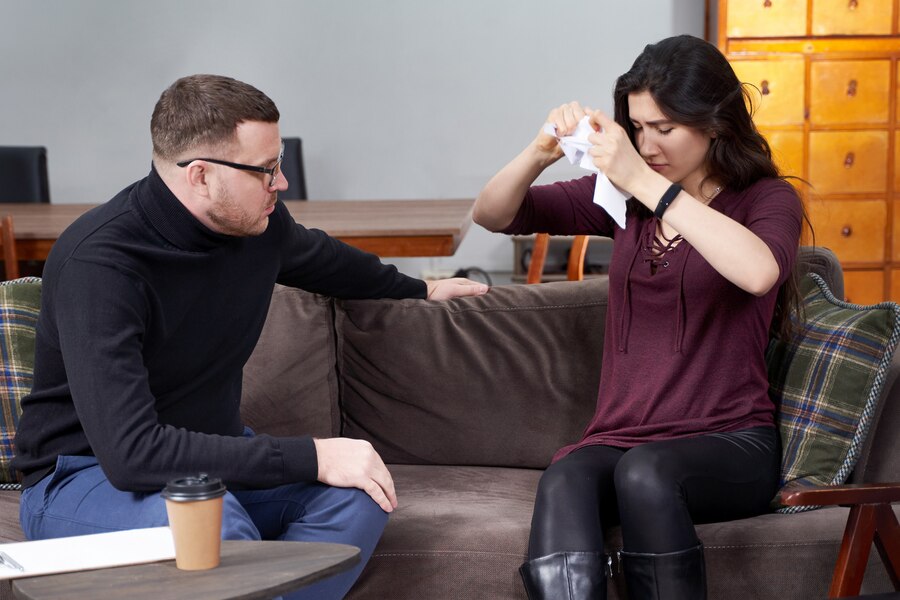Counseling and support play crucial roles in both individual and couples’ recovery journeys. They provide essential tools and emotional support needed to address personal struggles and foster personal growth. With a focus on safe spaces, the benefits of both individual and group counseling, and the importance of integrating support systems, this guide will help you understand how effective counseling and support can enhance recovery and personal development.
The Importance of Safe Spaces in Counseling
Creating a safe space is fundamental to effective counseling. A safe space allows individuals to express their thoughts, emotions, and experiences without fear of judgment or repercussions. In counseling settings, this environment is critical for fostering open and honest communication, which is essential for meaningful progress.
In a safe space, clients can explore their deepest concerns and vulnerabilities, which helps in addressing underlying issues that may be contributing to their struggles. This supportive environment encourages trust between the counselor and client, enabling a therapeutic relationship that facilitates personal growth and healing.
How Counseling Helps Address Personal Struggles
Counseling provides a structured approach to addressing personal struggles by offering a space to explore and understand one’s thoughts, emotions, and behaviors. Through counseling, individuals can identify and challenge negative thought patterns, develop coping strategies, and work towards resolving internal conflicts.
Counselors use various techniques and therapies tailored to individual needs to help clients overcome their challenges. This process not only assists in managing immediate issues but also equips individuals with skills and insights that contribute to long-term well-being and personal development.
The Role of Counselors in Providing Emotional Support
Counselors play a vital role in providing emotional support by listening empathetically, offering guidance, and helping clients navigate through difficult emotions. They create a supportive environment where clients feel heard and validated, which is essential for emotional healing.
In addition to offering emotional support, counselors help clients develop coping strategies, set achievable goals, and build resilience. Their professional guidance assists clients in making positive changes and working towards a healthier emotional state.
Understanding Different Types of Counseling: Individual and Group
Counseling can be delivered in various formats, with individual and group counseling being the most common.
Individual Counseling: This one-on-one approach allows for personalized attention and a tailored therapeutic process. It provides a private setting where clients can address their specific issues with a counselor’s undivided focus.
Group Counseling: Involves interacting with other individuals facing similar challenges. It offers the benefit of shared experiences, mutual support, and collective problem-solving. Group counseling can enhance self-awareness and provide a sense of community.
Each type of counseling has its unique benefits, and often, a combination of both can provide comprehensive support.
The Benefits of Support Groups in Recovery and Personal Growth
Support groups offer numerous benefits in recovery and personal growth. They provide a platform for individuals to connect with others who have similar experiences, share insights, and offer mutual encouragement.
Shared Experiences: Engaging with others who have faced similar struggles can be validating and reassuring. It fosters a sense of belonging and reduces feelings of isolation.
Mutual Support: Support groups offer emotional and practical support from peers who understand the challenges involved. This can enhance motivation and provide valuable perspectives.
Personal Growth: The collaborative nature of support groups encourages personal reflection, skill development, and the application of new coping strategies. It contributes to overall personal growth and self-improvement.

Building a Sense of Community Through Peer Support
Building a sense of community through peer support is integral to the recovery process. Peer support creates a network of individuals who share common goals and challenges, fostering a sense of unity and collective strength.
Encouragement and Motivation: Peer support provides encouragement and motivation through shared experiences and mutual support. This helps individuals stay committed to their recovery goals.
Shared Learning: Learning from others’ experiences and strategies can offer valuable insights and practical advice. This shared learning enhances personal growth and resilience.
The Role of Shared Experiences in Support Groups
Shared experiences in support groups play a significant role in fostering connection and understanding among members. When individuals share their personal stories and challenges, it creates a common ground that facilitates empathy and mutual support.
Empathy and Validation: Sharing experiences helps individuals feel understood and validated. It reinforces the idea that they are not alone in their struggles and that their experiences are valued.
Learning and Growth: Hearing about others’ experiences can provide new perspectives and coping strategies. It also offers opportunities for personal reflection and growth through the exchange of ideas and solutions.
How Support Groups Foster Accountability and Motivation
Support groups foster accountability and motivation by creating an environment where members hold each other responsible for their actions and progress. This peer accountability encourages commitment to recovery goals and personal development.
Regular Check-Ins: Scheduled group meetings provide regular opportunities for individuals to discuss their progress, set goals, and receive feedback. This structure supports ongoing motivation and accountability.
Encouraging Progress: Positive reinforcement and encouragement from group members help maintain motivation and focus. Celebrating milestones and achievements within the group reinforces commitment to personal goals.
Integrating Counseling with Support Group Participation
Integrating counseling with support group participation enhances the overall therapeutic experience. Combining individual or group counseling with support group involvement provides a well-rounded approach to addressing personal struggles and achieving recovery goals.
Complementary Benefits: While counseling offers personalized therapy and professional guidance, support groups provide peer support and shared experiences. Together, they create a comprehensive support system.
Holistic Approach: Integrating holistic treatments in both counseling and support groups addresses various aspects of recovery and personal growth. It offers a balanced approach to emotional support, skill development, and community building.
Finding the Right Counselor or Support Group for Your Needs
Finding the right counselor or support group involves researching options, assessing compatibility, and ensuring that the services align with your needs and goals.
Counselor Selection: Look for a counselor with experience in your specific areas of concern, and assess their approach to therapy. A good fit in terms of personality and therapeutic style is crucial for effective treatment.
Support Group Selection: Choose a support group that aligns with your needs, whether it’s based on specific issues, recovery goals, or personal preferences. Attend meetings to gauge the group’s dynamics and effectiveness.
Enhancing Recovery and Personal Growth Through Counseling and Support
Counseling and support play critical roles in enhancing recovery and personal growth. By providing safe spaces, addressing personal struggles, and integrating support systems, you can make meaningful progress in your recovery journey. If you’re ready to explore how counseling and support can benefit you, reach out to us today. We’re here to help you achieve your recovery goals and foster personal growth through effective counseling and support.
FAQs
What is the role of counseling and support in couples therapy and addiction treatment? Counseling and support provide a safe and supportive environment for individuals and couples to address emotional, psychological, and relationship challenges.
How can counseling and support help couples overcome addiction together? Counseling can help couples develop healthy communication skills, resolve conflicts, and navigate the challenges of addiction recovery. Support groups can provide a sense of community and understanding.
What are the different types of counseling and support available? Types of counseling include individual therapy, couples therapy, family therapy, and group therapy. Support groups can be specific to addiction recovery, relationship issues, or mental health conditions.
How can counseling and support help individuals manage emotions and stress during recovery? Counseling provides tools for managing emotions, reducing stress, and developing healthy coping mechanisms. Support groups offer a sense of community and understanding.
What are the benefits of seeking counseling and support for couples facing addiction challenges? Counseling can improve communication, strengthen relationships, and increase the chances of successful recovery. Support groups can provide a sense of belonging and encouragement.
How often should couples attend counseling sessions? The frequency of counseling sessions depends on individual needs and treatment goals. Typically, sessions are held weekly or bi-weekly.
Can counseling and support help address underlying issues that may contribute to addiction? Yes, counseling can help identify and address underlying mental health conditions, relationship difficulties, or trauma that may contribute to addiction.
How can I find a qualified counselor or support group in my area? Research therapists and support groups specializing in couples therapy or addiction recovery. Seek recommendations from healthcare providers or online directories.
Is counseling and support covered by insurance? Insurance coverage for counseling and support varies depending on your plan. Check with your insurance provider to determine your benefits.
What can I expect from my first counseling session? Expect to discuss your goals, concerns, and challenges. The therapist will create a personalized treatment plan tailored to your needs.




















